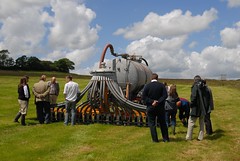
A date for your diaries…
BHS National Meeting
Surface water quality:
modelling, monitoring and management
* Wednesday 7 May 2008 *
The University of Birmingham
Water quality is key to a full understanding and management of water resources. The aim of this meeting is to identify recent exciting advances in monitoring and modelling surface water quality dynamics and processes, and evaluate their importance for water management. This forward-looking meeting will encourage dialogue between the ‘3Ms’ - modelling, monitoring and management - to identify, for example, mismatches in spatial and temporal resolution of datasets, models, scales of enquiry and process understanding in water quality, and promote discussion of future research, instrumentation and management needs. Questions will include: Are techniques and monitoring networks adequate for future challenges, and for quantifying environmental change impacts on water quality? What is the potential of newly-emergent methodologies? How strong are the models? Where should future work be directed? This meeting is especially timely, given that we are now halfway towards the Water Framework Directive (2000) target date of 2015 for inland and coastal waters to reach good ecological status. So please see this important meeting as a half-time ‘team talk’!
Sessions will be led by keynote speakers, including Tim Burt (Durham), Roger Falconer (Cardiff), Bob Harris (formerly EA, now Sheffield), Louise Heathwaite (Lancaster), Gilles Pinay (Birmingham) and Tony Warn (EA), to address some of the key issues above, including Integrated Catchment Management, monitoring, modeling and necessary action to meet water quality standards, surface water quality case studies, and future prospects.
Call for Papers and Posters: There will be time also for some submitted oral and poster presentations. If you would like to present at this timely meeting, please email an attached 250-word Abstract in Word with full contact details and paper/poster preference, to the conveners by 7 March 2008.
Who should attend? The meeting will bring together a good mix of scientists, engineers, water managers, regulators, consultants and policy-makers from universities, research institutes, the water industry, the Environment Agency and DEFRA. The meeting will also contribute towards Continuing Professional Development (CPD) requirements.
Conveners:
Damian Lawler, Andy Baker and Chris Bradley
School of Geography, Earth and Environmental Sciences
University of Birmingham, Birmingham B15 2TT, UK (Tel: 0121 - 414 – 6935 / 5532 / 44 / 43)
Emails: D.M.Lawler@bham.ac.uk a.baker.2@bham.ac.uk c.bradley@bham.ac.uk
http://www.gees.bham.ac.uk/people/index.asp?ID=112#112
http://www.gees.bham.ac.uk/people/index.asp?ID=260;
http://www.gees.bham.ac.uk/people/index.asp?ID=117























